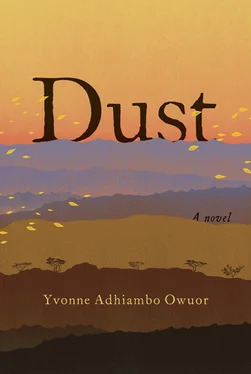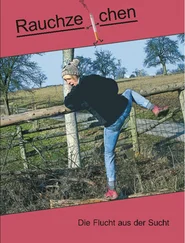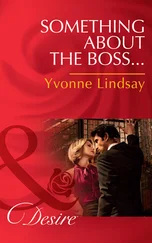Four and a half hours later, minute braids that curl red on the edges run down Ajany’s back. It costs a thousand shillings. The stocky woman plucks the money from Ajany’s hands, tucks it into her brassiere. She winks at their truce. Today Ajany had gained a passage out of Babylon.
Ajany leaves the salon, her head aching, heart melting.
She walks past a red kiosk, toward the matatu stop, wondering if she should call her taxi man instead.
The kiosk man calls her: “ He! You! Babi?”
Ajany focuses on the crowd at the terminal. She could curse as her mother would. Kick down the ramshackle red shop. Her eyes are fire when she glowers at the man, who is gesturing with chin and eyes. “Go to Justina.” He points at her. “Go.”
“Me?” she stammers.
“ Kwani , you see anyone else? Go!” he says. “Go!” A furtive look.
A customer approaches the shop.
He wants a sachet of milk and oil.
“Mluyia!”
The kiosk man snaps, “ Ati , Mluyia!” Like most citizens, he is now careful about small, unconsidered talk. New sensitivities. His cultural roots had not mattered before the chaos — not in the city. Now most citizens understated ethnic roots, overemphasizing Kenyan-ness in brash Kiswahili and even louder English. Renegotiating belonging, desperate faith in One Kenya.
Ajany returns to her quest for a ride home.
The kiosk man shouts, “ Weh! Oganda, umenisikia ?”
Ajany pivots; her new braids swirl. “How do you know my name?”
“Go to Justina.” He glares at her.
Ajany heart pounds. “Who’s J-justina?”
The man shuffles objects on his narrow shelf.
She says, “So where’s this Justina?”
“Ask that woman.” Chin points toward the Gloria’s God Gives salon, where the stocky hairdresser beckons her back.
JUSTINA’S DARK-BLUE CORRUGATED IRON DOOR IS OPEN. AJANY pushes it inward and finds a pregnant woman painting lines on a canvas that is perched on a sturdy wooden stand. The air in the room is stuffy, smoky, and tense, as if an argument has been interrupted. Ajany frowns when she sees the Windsor canvases that fill the room.
A stove reeks of paraffin. Cabbage in a small sufuria on the boil, as a hen cackles under a large wooden bed with a cheap purple velvet headboard.
Ajany’s eyes adjust to the dimness. “Justina?”
The woman gives her a side glance, offers nothing.
Justina is a long woman, no other way to describe her. Long fingers, long nose, long thin earlobes, and long limbs. Her muumuu is yellow, her lipstick too dark. She waves her squirrel-fur brush at Ajany. Nibbling her nails, she tilts her head at the canvas with its slash of red, its airbrushed-looking violet horizons.
The hovel’s door eases shut behind Ajany and locks into place. Ajany then notices a pair of a man’s dark-brown leather shoes placed behind the door. She reaches for them.
“Don’t …” starts Justina.
Ajany picks up the shoes anyway, eyes closed. Lifts them to her face, inhales the residue of sweat and dust. The smells become life, acquire a voice. A dog yaps. New grief creeps in. The day I meet God, I’ll throw my spear at him .…
Justina paints.
Time evaporates.
Justina dips her brush into a metal mug. She tells Ajany, with a sudden side look, “I saw you.”
Ajany lowers the shoes, arranges them where they had been.
Justina says, “Saw you looking for Odi.” She scatters the excess liquid from the brush across the concrete floor. Red color splatters on concrete. A drop lands on an Ajua board set on a table.
An unfinished game.
Ajany stares at the board.
“Un tem fé, si un tem fê … mh, mh, mh … medo e confians …” Justina hums, “ lalalala …”
Cesária Évora.
Ajany’s eyes fixate on the board.
Two rows, six cups. Forty-eight seed “cattle.”
Two extra holes.
Cattle storage areas.
She walks toward it, squats.
Sows seeds counterclockwise on the board, one at a time.
The aim of the game — practicing brigandage.
Take cattle, retain your own.
Justina approaches. “Only you may touch that, nobody else.”
Ajany almost slumps to the ground.
“Before he went that day, we played.”
Ajany rocks on her heels, hands covering her face.
“Don’t …” says Justina.
The hen clucks.
Justina bends and tugs at Ajany’s left hand, lifts it, and places it on her stomach. Fluttering movements within. Her baby stirs.
Ajany’s eyes meet Justina’s. Justina gives her a half smile, a tiny nod. A small sound as Ajany rises at once and presses her head to Justina’s stomach.
Justina cradles Ajany’s face, paintbrush in hand. She touches her brush to Ajany’s tears. “He wanted to tell you himself.”
“Odidi?” She needed to speak his name here.
Justina’s voice is low, with a touch of mischief. “I hooked him. He came to Twilight 333. I was there. I saw him. I wanted him. I got him.”
Justina is watching Ajany’s reactions. Ajany stares at the ground.
Twilight 333. The dome-shaped go-go lap-dance magnet. Floor shows, and rooms on the side for assignations and deals.
Justina’s lashes flutter.
“He came with me. He never left.” She looks into the distance, and a smile appears on her mouth, revealing a dimple in her left cheek. “He paid a daily no-service fee.”
Ajany asks, “And you p-paint?”
“Sex for oils and canvas.” Justina’s eyes harden; the ends of her mouth turn down. “Odi-Ebe — he wasn’t supposed to die.”
They take in the canvases, oils, paint powder, turpentine. Justina rubs her face, in fear of tears.
Silence.
Justina says, “He told me you painted.” A laugh. “We were coming to see you, Arabel.”
Ajany lowers her head.
“He got tablets — see — to help him sleep in the plane.…”
The room was closing in. Ajany’s body collapses in uncontrollable weakness, she is on her knees, her head drops to the floor. She lifts her arms to support her head, face turned toward a wall. Paint a river out of Wuoth Ogik .
“Do you like this?” Justina points to a canvas on the wall. Next to one of the photocopies of Odidi that Ajany had distributed, Odidi’s eyes, a triptych in four shades of rust. Next to the eyes, a square canvas on which a dancer in blue shadow leans against a copper-colored pole; she has exaggerated eyes. The gaze.
Ajany looks.
She asks, “What’s the tint?”
“Henna.” Justina turns to Ajany, stroking her face. “I’ll paint you.”
Ajany whimpers.
Justina whispers, “He wasn’t supposed to die, Arabel.” She drops her brush. “I wanted to see you.”
“Why?”
“To know what it would do to me.”
“And?”
Justina examines Ajany, eyes half lidded. “You’re nothing to me.”
Ajany steps back, gasps, recovers, tugs at a sudden sharp ache within her heart.
Justina grunts and says, looking at nothing, “Where is he?”
“Who?”
A whisper now: “Odidi, where is he?”
Silence.
Two years ago, Odidi had stepped into the frenzied friendliness of Twilight 333, away from cold city streets and the growing list of friends who could no longer abide his presence. He walked in for the music; it was something Angolan, and at once he wondered if he should call his sister. He walked in because he was exhausted by his helplessness, and the uselessness of his crying out to citizens, trying to alert them to the reasons they were paying six times the price for bread, fuel, milk, and sugar. Why their shilling had plunged, and why there were now multi-billionaires shopping for helicopters in their midst. He understood that as long as there was enough to move the day, beyond a grumble, people really didn’t care to know why their lives had become harder. They prayed. They organized themselves into cooperatives. They prayed. They wanted good things for their children. Worn out. He had tried.
Читать дальше











